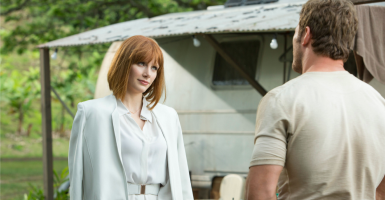“Jurassic World” just broke the all-time first-weekend box office record, but not all audience members were pleased. Before and after the film’s release, feminists attacked the movie as sexist. Although it is possible to interpret the film this way, “Jurassic World” portrays a complex, dynamic heroine who does not fit neatly into such a box.
Filmmaker Joss Whedon launched the feminist outcry with a tweet after seeing the trailer. Attacking the clip as “‘70s-era sexist,” Whedon encapsulated the argument against the film in six short words—“She’s a stiff; he’s a life-force.” After seeing the film, writers at sites such as The Daily Beast and The Mary Sue further attacked the film as sexist.
Indeed, the film’s protagonist, Claire Dearing (Bryce Dallas Howard), starts off as a fast-paced, overly intense and even dismissive workaholic. Manager of a multi-million dollar park, she overworks herself and only begrudgingly agrees to watch over her nephews while her sister is getting a divorce.
After long sequences of life-threatening danger and flirting jibes from adventurous hunk Owen Grady (Chris Pratt), Claire loosens up, learns to care about her nephews and falls in love.
Worse still, Claire’s sister, Karen (Judy Greer), insists she will “settle down” and have kids someday. Explaining her constant worry about her sons, Karen tells Claire, “You’ll see when you have kids.” Claire responds with a quick and punctuated “if,” to which her sister responds forcefully, “when.”
Finally, Claire’s character transformation seems connected to her speedy and underdeveloped romance with Owen. At the beginning, they remember why their first date didn’t work, but by the end they are arm in arm. This change, along with Claire’s growing connection with her nephews, is what The Daily Beast’s Marlow Stern means when he says “Jurassic World” is “about a woman’s ‘evolution’ from an icy-cold, selfish corporate shill into a considerate wife and mother.”
These elements are all there, but feminists have to twist the story to make them work. Claire’s transformation is not about a professional becoming a stay-at-home mom, but a workaholic learning to love the people around her as opposed to her job. At the beginning, she knows how to make money. At the end, she saves lives by risking her own.
Furthermore, her growth falls squarely in line with the “Jurassic Park” tradition of character development. In the first movie, Dr. Alan Grant (Sam Neill) learned to love children. In “The Lost World,” Dr. Ian Malcolm (Jeff Goldblum) learned how to be a good father. In “Jurassic Park III,” we learn that Dr. Grant did not end up becoming a father himself, but his life was enriched by his newfound love of children.
In attacking “Jurassic World” as sexist, Stern claims that “Jurassic Park didn’t have any of this gendered nonsense.” In the 1993 film, Dr. Grant and his love interest, Dr. Ellie Sattler (Laura Dern), were equals, but Claire and Owen are not, Stern argues. In this, he is wrong—Dr. Sattler constantly mocks Dr. Grant about his fear of children, just as Owen mocks Claire about ignoring her nephews. In Stern’s mind, it seems that when a man learns to love children, that’s natural. But when it’s a woman, that’s sexist.
But doesn’t the prediction of motherhood made by Claire’s sister, Karen, confirm the film’s sexism? Not necessarily. Karen makes this comment while worried for the safety of her boys and in the middle of a divorce. Furthermore, the film does not confirm its truth. Indeed, far from becoming “a wife and mother” by the end of the film, Claire merely has a boyfriend and stronger ties with her family. If “Jurassic World” wished to prove that all women need to be mothers, why did it not end by showing Claire happily married with kids?
The film does make a statement about Claire’s character—and the character of all people who put work above relationships with friends and family. People will be happier if they invest in other people. After all, whoever says on their deathbed “I wish I had spent more time at the office?” As The Federalist’s Mollie Hemingway pointed out, it is rather ironic that the same liberals who argue against gender roles wish to enforce one particular role on women—a focus on the workplace.
As for the importance of Owen Grady (Chris Pratt) to Claire’s character development, it seems insulting to assume she could not have risen to the challenge without a boy to impress. Yes, he is the swaggering outdoor type, but she is a successful businesswoman with her own acumen.
When Claire takes an impressive risk to solve an imminent dinosaur problem, she may be translating Owen’s bravado to another situation—but isn’t it more likely she has discovered her own? In some respect, the feminist complaint that Claire becomes a hero only because of Owen minimizes her character in a way alien to the movie itself. Yes, Owen helps her grow—but at the end of the day it is Claire who saves their lives. Indeed, feminists should love this movie.
Claire isn’t a stereotypical “strong female character” brought in to appease feminists or the girl who exists only to be the hero’s love interest. She is the hero herself. More than that, she is a dynamic heroine who overcomes a struggle endemic to modernity—a life-draining emphasis on work.
Here is the true lifeblood of “Jurassic World”—answering the modern emptiness felt by workaholic and bored consumer alike. Claire gets bogged down in work, but her nephew Zach (Nick Robinson) is a stereotypical teen, allowing himself to be bored and distracted. He, too, finds a way out of loneliness and into companionship—not by becoming a wife and mother, but by bonding with his younger brother Gray (Ty Simpkins).
Beyond sexism and ageism, or whatever potentially offensive theme reviewers claim to find in this movie, “Jurassic World” is about wonder. When we become engrossed in our own worries and obsessions, we sometimes need a little jolt to reawaken us to the beauties and dangers in the world around us.
As a minor character eloquently explains, “Jurassic Park exists to remind us how small we really are.”



























